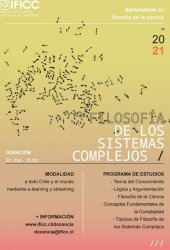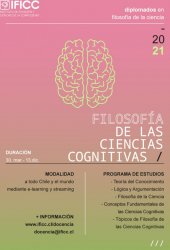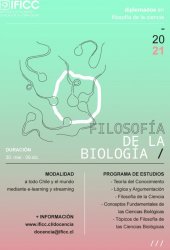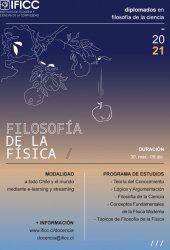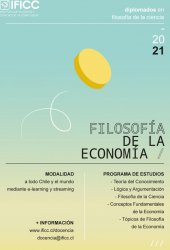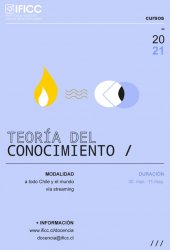Nodo de Biología Teórica y Complejidad
LABORATORY OF THEORETICAL BIOLOGY AND COMPLEXITY
Office: Los Alerces 3024, Ñuñoa, Santiago, Chile
Fone: (56-2) 27276403
Director of Institute of Philosophy and Complexity Sciences
"There seems to be no limit to the amount of information that we can accumulate, and today, at the end of the millenium, we face the question of what is to be done with all of this information... [I]t is clear that the prime intellectual task of the future lies in constructing an appropiate theoretical framework for biology"
Sydney Brenner. Nobel Prize 2002.
Brenner, S. 1999. Theoretical Biology in the Third Millennium. Philosophical Transactions: Biological Sciences 354(1392): 1963-1965.
Research
The central area of interest of the lab is the interdisciplinary use of theoretical tools from mathematics and informatics to model biological and other kinds of complex systems. Specifically, projects focus on developing theory of multidimensional phase spaces to model evolutionary, ecological, neurobiological and social processes. The lab is also characterized by the discussion on conceptual and philosophical issues involved in theoretical modeling and complexity.
On-going research interests
Modeling evolution in multidimensional phase spaces
The Fisher geometrical model represents evolution as a walk in a phase space of phenotypic quantitative traits (axes) in which the origin corresponds to a local optimum for the combination of traits (see Figure below). Complexity is represented by the number of dimensions.
We study molecular and phenotypic evolution in the multidimensional Fisher's geometrical model. We emphasize the power of simulational results in the quest for obtaining more realistic results of evolutionary processes.
Publications:
Randomness in complex systems
Randomness in neurobiology: Waves can be represented as rotating vectors in the bidimensional complex space (phasors). The superposition of waves can be represented as the vectorial summation of such phasors. If the superposition of neurobiological waves is perfectly asynchronous, the process can be represented as a bidimensional random walk. We focus on developing theory and statistical methods for analyzing neurobiological waves in bidimensional phase spaces.
Publications:
This paper in the cover illustration of the journal's issue:
In coolaboration with: Javier Díaz.
Multidimensional random walks: mathematics, evolution and physics: The multidimensional random walk represents the simplest null model for processes that are represented as walks in a multidimensional space. Although the random walk problem was proposed 105 years ago, solutions are very intrincate. We found symple ways to solve the d-dimensional random walk problem. We apply previous results to model neutral, pan-neutral and nearly neutral evolution at the phenotypic level. Also we found the multidimensional Maxwell-Boltzmann distribution.
Publications:
RAZETO-BARRY, P., DÍAZ, J., ABELIUK, A. & LINKER, A. 2013. Computational methods for the generation of random mutations in multidimensional geometric evolutionary models. BMC Research Notes (in review)
P. RAZETO-BARRY & J. DÍAZ. 2013. A multidimensional neutral model of phenotypic evolution. Biology Direct (in review).
P. RAZETO-BARRY 2013. Evolutionary random flights, or on the tendency of varieties to depart indefinitely from the original type. (in elaboration)
Cellular automata and ecological modeling
Ecological and environmental questions have a promising way to be analyzed by cellular automata and other mathematical and computational tools. In the lab we study social and ecological factors that impact the environment via the cellular automata modeling. This tool enable us deepen into theoretical and predictive questions about the impact of humans and native species on ecosystems.
Publications:
RAMOS-JILIBERTO, R., URBANI, P., GARAY-NARVÁEZ, L., RAZETO-BARRY, P., ENCINA-MONTOYA, F. & MEDINA, M.H.. 2013. Identificación de especies ecológicamente relevantes para la Evaluación de Riesgo Ecológico: una propuesta desde la ecología teórica. Revista Chilena de Historia Natural (in press)
K. MALDONADO, P. RAZETO-BARRY & P. SABAT 2013. Individual specialization and phenotypic flexibility: a cellular automata model and its examination using passerine bird populations. (In elaboration)
M. MOLINA-MONTENEGRO, P. RAZETO-BARRY et al. 2013. Plant invasions in the Antarctic continent: vectors and consequences (In elaboration)
R. DELGADO. 2010. ¿Cómo la expansión de los asentamientos humanos afecta la biodiversidad? Un estudio de la importancia de las condiciones históricas iniciales mediante un modelo basado en agente. MSc. Thesis, Universidad Bolivariana-IFICC. (Advisor: P. RAZETO-BARRY)
Philosophical analysis and social modeling
Conceptual analysis in philosophy of science and social modeling are two related interests of the lab. Philosophical issues about probabilistic causation are important to develop more interpretable and feasible models. We discuss philosophical problems related to natural selection, origin of life and social evolution. Also we develop social models to represent cultural and social evolutionary processes via artificial chemistry and multiagent modeling.
Publications:
RAZETO-BARRY, P. 2012. Autopoiesis 40 years later. A review and a reformulation. Origin of Life and Evolution of Biospheres 42(6): 543-567.
P. RAZETO-BARRY & R. FRICK. 2011. Probabilistic causation and the explanatory role of natural selection. Studies in History and Philosophy of Biological and Biomedical Sciences 42(3):344-355.
P. RAZETO-BARRY. 2013. What should be the first law of biology? Studies in History and Philosophy of Biological and Biomedical Sciences (In review)
RAZETO-BARRY, P. 2013. Una adaptación interpretada del Poema de Parménides. Revista de Filosofía (En revisión).
RAZETO-BARRY, P. & María E. Pizarro-Sandoval. 2013. Moral ecosystem services.Ecological Economics (in review)
RAZETO-BARRY, P., GONZÁLEZ, E., ARREDONDO-NUÑEZ, A., RAZETO, M. 2013. Efectividad del Método Gödel en la enseñanza de las ciencias. Un estudio preliminar. Revista Iberoamericana de Evaluación Educativa (en revisión).
C. BLANCO. 2011. Presiones de selección comunicativa: Una modelación basada en agentes para la explicación de patrones globales de diversidad cultural. MSc. Thesis Magister en Análisis Sistémico Aplicado a la Sociedad, Facultad de Ciencias Sociales, Universidad de Chile. (Advisor: P. RAZETO-BARRY)
Colaborators
Javier Díaz
Postgraduate Students
Past postgraduate students:
Mg. Marcos Moreno
Mg. Rosa María Pascucci
Courses
Introduction to the complex systems modeling

